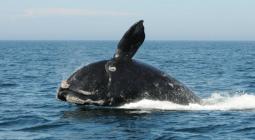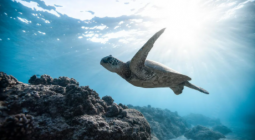Stranding of three whales in Corfu raises alarm over seismic testing for fossil fuels

While cause remains unconfirmed, green groups fear the three whales could be the ‘tip of iceberg’ with many more animals hurt.
Environmental groups have linked the beaching of three whales in Corfu to seismic testing for oil and gas in the waters off the Greek island.
Two Cuvier’s beaked whales were found stranded at Arillas and Agios Gordios beaches on the west of the island on 20 February. A third beaked whale ran ashore on Agios Gordios beach the day after.
“It took dozens of volunteers over five hours using rudimentary ropes to hoist the whales back in the sea,” said local vet Nastazia Koronaki, who helped coordinate the rescue efforts.
Beached whales are not unknown in Greece, but for three healthy whales to be stranded on the same coastline within such a short space of time is unusual, said Koronaki.
While it has not been established what caused the whales to become stranded, environmental groups suspect the beachings were connected to SW Cook, a ship commissioned by oil company Hellenic Petroleum, which has been conducting testing in the Ionian Sea off the Corfu coastline. This region includes the Hellenic trench and the Ionian Sea archipelago, which have been designated important marine mammal areas.
Seismic testing is a method of oil and gas exploration that involves continuously blasting the seafloor with airguns to map the fossil fuels below. These blasts can reach more than 250 decibels. The effect of these sound levels on marine mammals is “like a bomb repeatedly going off in their home every 10 seconds – a home they can’t flee”, according to US non-profit the National Resources Defense Council.
Research has linked seismic testing to a range of negative impacts in marine animals, including hearing impairment, difficulties with feeding and interference with communication. In beaked whales, which are deep divers, studies have found links between seismic testing and decompression sickness.
The whale beachings were “probably only the tip of the iceberg,” said Nicolas Entrup, director of international relations at the non-profit OceanCare. “Many more animals, and not only whales, may have been harmed. Animals exposed to this intense sound may get killed and sink to the bottom of the sea.”
Last month, the two environmental organisations, along with other non-profits, wrote to the Greek prime minister calling for a halt to seismic testing until the cause of the whale beachings can be established. Greenpeace also sent its ship, Rainbow Warrior III, to monitor SW Cook.
According to reports, the seismic surveys were paused after the beachings and the SW Cook has now left Greece, said Dimitris Ibrahim, climate officer at WWF Greece.
Hellenic Petroleum did not respond to requests for comment.
The beachings have also raised awareness of the larger issue of oil and gas exploration in the Ionian Sea. Photos and videos of stranded whales spread quickly on social media and questions have been asked in parliament by Greece’s opposition Syriza party.
A protest on Corfu brought together environmental activists and tourism industry workers. “People are really scared because we live from tourism, and this could destroy the local economy,” said Giannis Gasteratos, one of those protesting on the island.
The Ionian Sea is notoriously deep and tectonically active, which could make any potential oil and gas extraction extremely risky.
Even if oil and gas reserves were detected, Greece would not have the infrastructure to exploit them until about 2030, said Ibrahim. “It is crazy that we are even considering extracting fossil fuels that far in the future. It is disastrous from a climate standpoint and makes no sense in the context of the Paris agreement.”
Environmental oversight in Greece has been “seriously degraded” over the past few years, Ibrahim said. All that is required for seismic testing is an environmental action plan, he said, “which is private, requires no approval by the state, no public consultation, and which the company is under no obligation to publish”.
Kostis Grimanis, spokesperson for Greenpeace Greece, called the seismic surveys “a death sentence for many marine animals”. He added: “You shouldn’t be jeopardising the marine environment, especially for a country that uses its azure seas for tourism. Oil and gas need to remain in the seafloor and we have to invest in renewables.”
Author: Alex Sakalis
Photograph: Anestis





